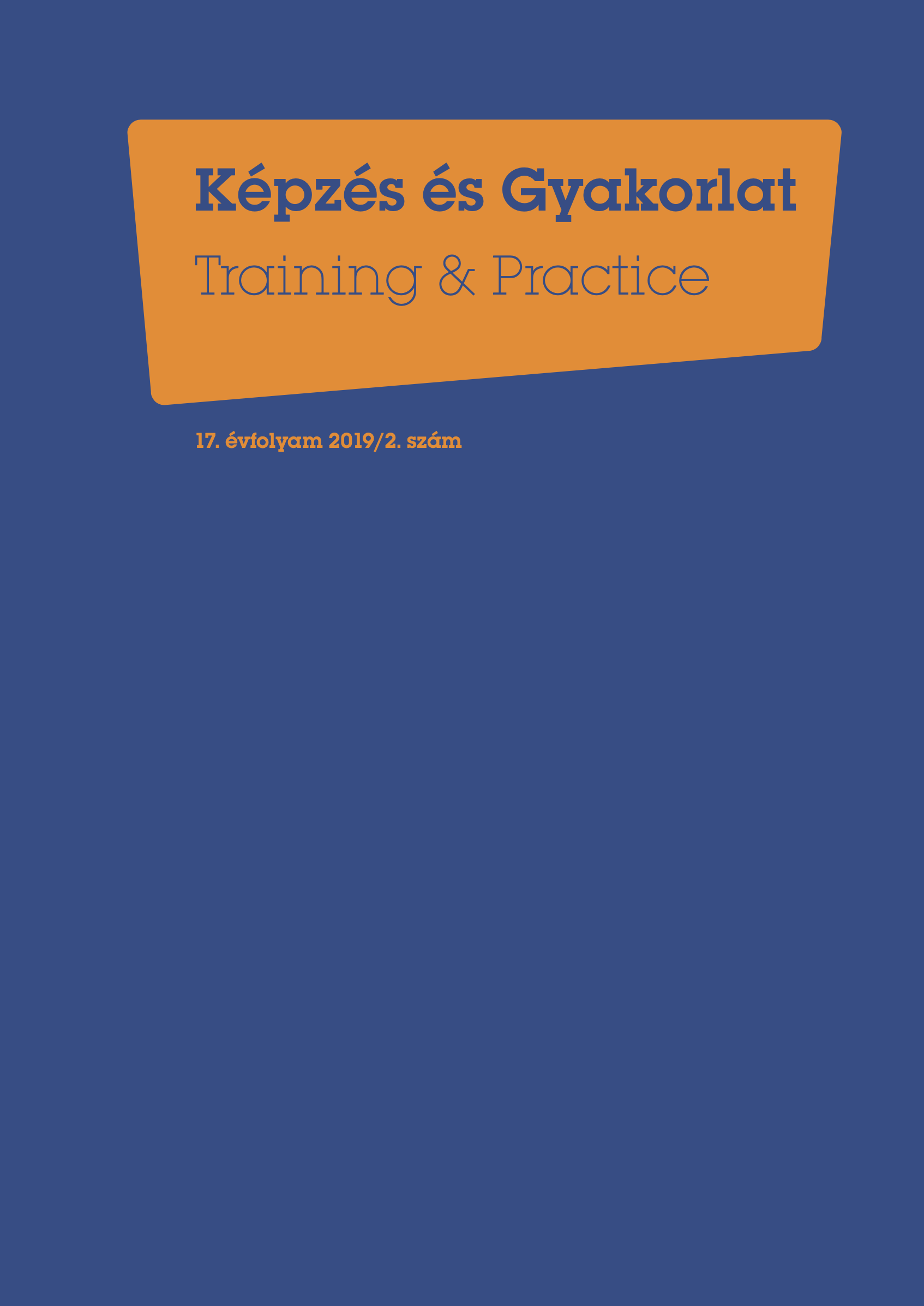Teaching on the Run – Learning on the Go
DOI:
https://doi.org/10.17165/TP.2019.2.1Absztrakt
In an attempt to prepare students to meet the demand of the future workforce, and also to address the dropout crisis, educators are looking for new ways to integrate virtual worlds into the curricula. Digital economy finds its way to the tech-savvy youth. The number of computers, smartboards, and all kinds of widgets serving digital education are on the rise. Still, on the most part, our academic institutions continue to follow a 19th-century path based on rote learning and high-stakes testing. The paper intends to summarize some of the dominating notions that define the prevailing narratives of these issues. It also aims to explore the discrepancy between the imagined and the real learning environment while shedding light on the 2015 PISA results that show that technology alone will neither improve pupils' achievement nor will it help prepare them for the 21st-century labor market needs.
Hivatkozások
A DIGITÁLIS JÓLÉT PROGRAM 2.0 [online] forrás [10.01.2018]
Coughlan, S. (2015). Computers 'do not improve' pupil results, says OECD [online] http://www.bbc.com/news/business-34174796 [10.01.2018]
Daly, J. (2008). Tomorrowland Today. Edutopia. [online] https://www.edutopia.org/editors-note-creativity-innovation [01.02.2018]
Daniel, J. (2007). Technology and the Media Have Transformed All Aspects of Human Life Except Education. Economist. com. Oct. 24. [online] http://www.economist.com/debate/index.cfm?action=article&debateid=1&storyid=9968827 [18. 04. 2016]
Frey, C.B. - Osborne, M. A. (2017). The future of employment: How susceptible are jobs computerisation? Technological Forecasting and Social Change, 114, pp. 254-280. DOI: https://doi.org/10.1016/j.techfore.2016.08.019
Front Matter. National Research Council. (2012). Education for Life and Work: Developing Transferable Knowledge and Skills in the 21st Century. Washington, DC: The National Academies Press. [online] https://www.nap.edu/catalog/13398/education-for-life-and-work-developing-transferable-knowledge-and-skills [08.02.2016]
Future of work and skills [online] https://www.oecd.org/els/emp/wcms_556984.pdf [10.01.2018]
Hagymásy, T. - Könyvesi, T. (szerk.) (2017). Köznevelési statisztikai évkönyv [online] forrás [10.01.2018]
Hallett, R. - Hutt, R. (2016). 10 jobs that didn't exist 10 years ago. [online] https://www.weforum.org/agenda/2016/06/10-jobs-that-didn-t-exist-10-years-ago/
Heim, J. (2016). Finland's schools were once the envy of the world. Now, they're slipping. The Washington Post. [online] https://www.washingtonpost.com/local/education/finlands-schools-were-once-the-envy-of-the-world-now-theyre-slipping/2016/12/08/dcfd0f56-bd60-11e6-91ee-1adddfe36cbe_story.html?utm_term=.95a5ca975f0b [10.10.2018]
Hockley, N. (2012). Digital literacies. ELT Journal, Vol.66 no.1., pp.108-112. DOI: https://doi.org/10.1093/elt/ccr077
Levy, F. - Murnane, R.J. (2004). The New Division of Labor: How Computers Are Creating the Next Job Market. Princeton, N.J.; Princeton University Press. DOI: https://doi.org/10.1515/9781400845927
Maggid, Larry (2010). Study: 92% of U.S. 2-year-olds have online record [online] https://www.cnet.com/news/study-92-of-u-s-2-year-olds-have-online-record/ [10.01.2018]
McMurtrie, B. (2015). Inside Startup U: How Stanford Develops Entrepreneurial Students. The Chronicle of Higher Education. Oct. 25. [online] https://www.chronicle.com/article/Inside-Startup-U-How/233899 [08.02.2016]
Mozaik: Education [online] http://www.mozaweb.com/hu [10.01.2018]
OECD (2015). Students, Computers and Learning. Making the Connection. Paris: OECD. DOI: https://doi.org/10.1787/9789264239555-en
Online Learning. The New Classroom: Virtual Education Goes Mainstream. The Chronicle of Higher Education. November 5, 2012. B4. [online] http://library.cotr.bc.ca/Documents/NewClassroomChronicle2010.pdf [11.11.2018]
Overprotective parent who discourages a child's independence by being too involved in the child's live. Based on: Helicopter parent [online] http://www.dictionary.com/browse/helicopter--parent [10.01.2018]
Partnership for 21st century learning. [online] http://www.p21.org/our-work/p21-framework [10.01.2018]
Papanastasiou, E.C. - Zembylas, M. - Vrasidas, C. (2003). Can Computer Use Hurt Science Achievement? The USA Results from PISA. Journal of Science Education and Technology, Vol. 12. no.3, [online] https://www.learntechlib.org/p/97188/ [05. 05. 2018] DOI: https://doi.org/10.1023/A:1025093225753
PISA (2015a). Results. Excellence and equity in education. Volume I. OECD library. Students, Computers and Learning. Collaborative Problem Solving. PISA in Focus. [online] http://www.oecd.org/education/pisa-2015-results-volume-i-9789264266490-en.htm [10.01.2018]
PISA (2015b). Results (Volume I): Excellence and Equity in Education DOI: https://doi.org/10.1787/9789264266490-graph1-en
Prensky, M. (2016). Education to better their world. [online] http://bettertheirworld.org/wp-content/uploads/2017/07/Prensky-ETBW-Ch1.pdf [05.05.2018]
Ryerson, L. (2019). 10 jobs that won't exist 20 years from now. [online] https://www.thisisinsider.com/jobs-going-extinct-2018-5 [10.01.2018]
Song, J.S. (2016). PISA and Digital Literacy. [online] https://all4ed.org/pisa-and-digital-literacy/ [10.03. 2018]
Szabó, Zs. (2017). Elgondolkodtató adatok a fiatalok nethasználatáról forrás [10.01.2018]
Swing, L.E. - Gentile A. D. - Anderson, A. C. - Walsh, A. D. (2010). Television and Video Game Exposure and the Development of Attention Problems. PEDIATRICS, 126(2), pp.214-221. DOI: https://doi.org/10.1542/peds.2009-1508
The Soapbox Lord (2018?): The top 25 baby names inspired by video game characters [online] https://www.gameskinny.com/s2x4c/the-top-25-baby-names-inspired-by-video-game-characters [12.03.2016]
Letöltések
Megjelent
Folyóirat szám
Rovat
License
Copyright (c) 2019 Maria Bajner

This work is licensed under a Creative Commons Attribution-NonCommercial-NoDerivatives 4.0 International License.








